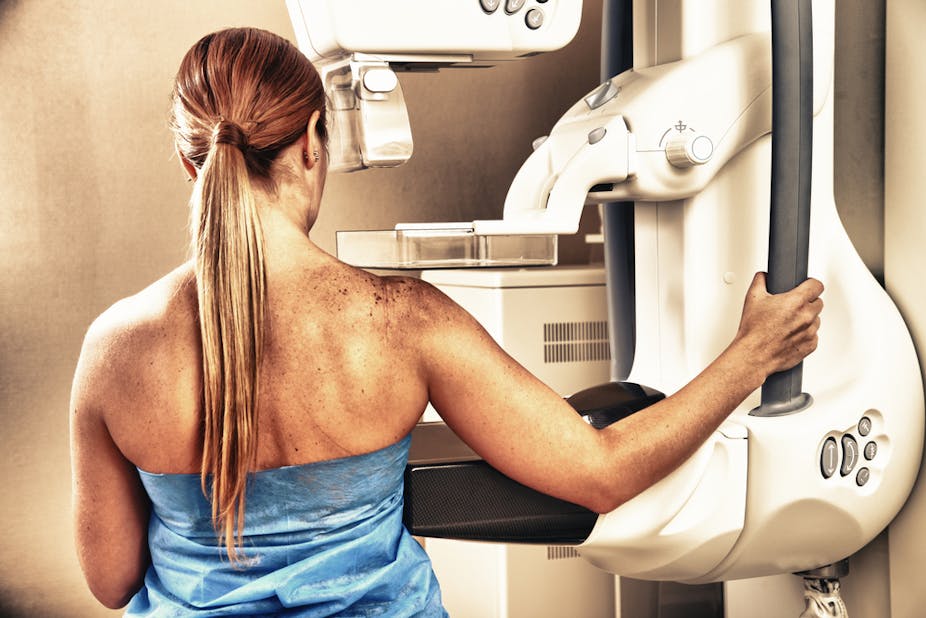Screening can save lives, which is why the NHS offers checks for breast, cervical and bowel cancers. Breast screening tries to pick up cancer at an early stage when it may be more treatable. Cervical screening aims to prevent cancer developing by detecting and treating abnormal cells on the cervix, and bowel screening includes both elements, including a new Bowelscope test to find and treat pre-cancerous polyps. As part of these programmes, people are encouraged to make informed choices about whether to take part or not.
In a new study published in the British Journal of Cancer, we wanted to find out more about how the public views cancer screening and whether people think it’s a good thing to do. We found that public enthusiasm for cancer screening is very high indeed. Our survey of nearly 2,000 men and women aged 50 to 80 across the UK revealed that 89% of them thought that cancer screening for healthy people was “almost always a good idea”.
Most people also believed that finding cancer early meant less treatment would be needed and that treatment would be more likely to be life-saving. These overwhelmingly positive attitudes were perhaps surprising, given that around half of men and women who are sent the home-based bowel screening kit complete the test, and uptake of breast and cervical screening are both just below 80%.
It is generally true that cancer screening has public health benefits, but it does also do harm; the most serious of which is the potential for overdiagnosis or over-detection – that is, picking up cancers that never would have done any harm, and that would never have come to light if we hadn’t looked for them. This is something that is far from intuitive for many people and which runs counter to long-standing messages about the importance of “catching cancer early”.
A recent independent review of breast screening in the UK estimated that for every woman who has her life saved by screening, three women will be overdiagnosed and treated for a cancer that would never have harmed them.

Wanting to know whatever the cost
It was striking in our survey that nearly half of the respondents said they would want to be tested to see if they had the kind of slow-growing cancer that would be unlikely to cause harm in their lifetime. Many experts in the field assume that if people understood about the risk of overdiagnosis (particularly in the context of breast and prostate cancer), they would make different decisions about screening participation. Our findings suggest this might not be the case.
One possibility is that people don’t understand that this kind of diagnosis might lead to unnecessary surgery, chemotherapy or radiotherapy, with all the side-effects that those treatments involve. Another possibility is that people have such an entrenched view of cancer as a killer that they find it difficult to conceive of having a tumour that might not need treatment – and would rather have it removed, even if there’s no clear health benefit to doing so, and if the treatment may even harm their health.
Opinion was spilt about the value of knowing about an incurable cancer – 49% of the sample would still want to know, even if nothing could be done, but 46% would rather not know. Perhaps people vary in how important it is for them to have time to plan for their death, and how this weighs against the benefits of enjoying life without a cancer diagnosis.
Different situations
Two-thirds of women, and almost as many men judged a person who didn’t go for screening to be “irresponsible”, which suggests that not everyone sees non-attendance for cancer screening as a legitimate, personal choice.
We continue to work on finding the best ways to communicate with the public about cancer screening so that everyone can understand the harms and benefits and make a choice about whether to take part. But this study has made us realise that it might be difficult to persuade people that screening is only worthwhile for certain cancers and in certain groups.
It’s great that the message about the potential benefits of prevention and early diagnosis is getting through, but now we may need more nuanced messages so that we all understand that there are exceptions to this rule, and that in some cases, not being screened is a sensible decision.

